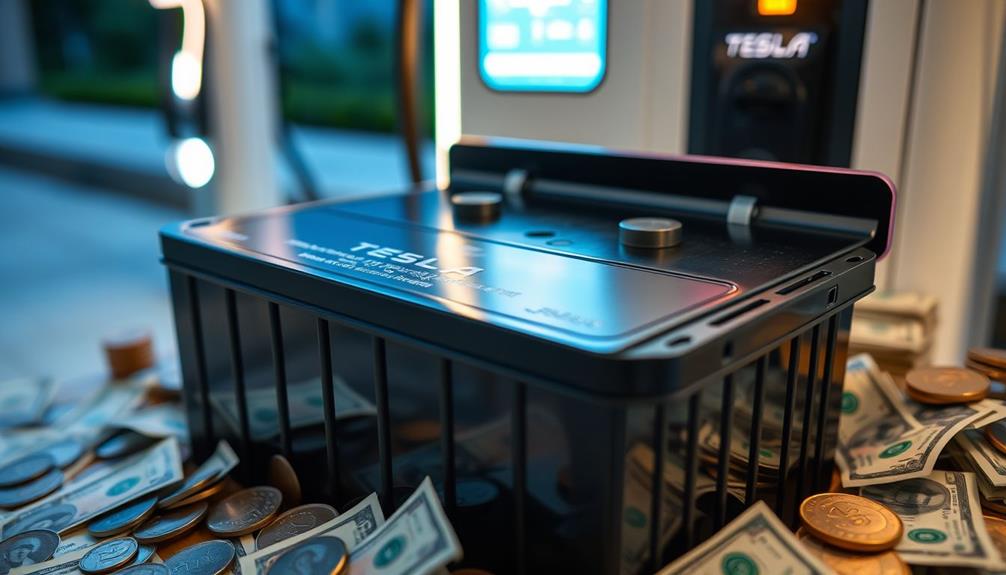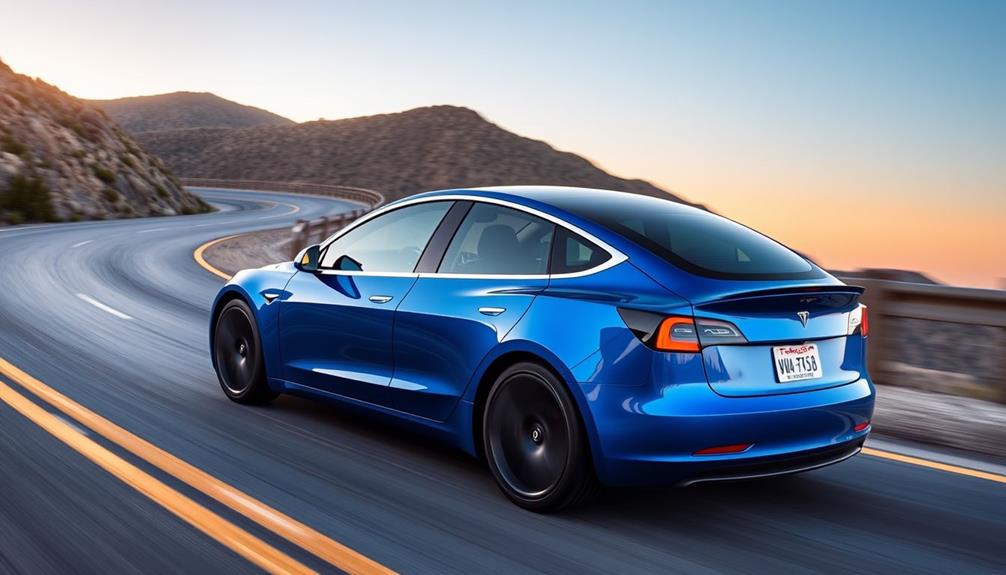Tesla battery costs range from about $5,000 to over $28,000, varying by model and specific features. For instance, replacing a Model S can run you between $12,000 to $15,500, while the Model 3 averages around $13,000. Labor costs also factor in, adding another $525 to $2,600 to the total. Market demand for materials like lithium and nickel can influence these prices too. If you want to get the most out of your investment and explore options, there's much more to uncover about battery lifespan and maintenance strategies you might find helpful.
Key Takeaways
- Replacement costs for Tesla batteries vary by model, ranging from $5,000 to $28,000 based on specifications and type.
- Model S battery replacements typically cost between $12,000 and $15,500, while Model 3 averages around $13,000.
- Labor costs for battery replacement can add an additional $525 to $2,600 to the overall expense.
- Battery lifespan ranges from 10 to 20 years, with warranties covering up to 150,000 miles for Model S/X and 100,000 miles for Model 3/Y.
- Market demand for minerals like lithium and nickel influences battery costs, causing potential price fluctuations over time.
Tesla Battery Replacement Costs

When it comes to replacing a Tesla battery, costs can vary greatly depending on the model and other factors. For a Model S battery replacement, you're looking at an estimated cost ranging from $12,000 to $15,500, with total replacement costs potentially hitting $20,000 to $22,000.
If you own a Model 3, battery replacement costs start around $13,500, with estimates reaching up to $28,000 based on battery size and specifications. The Model Y battery replacement costs align closely with the Model 3, averaging around $15,000 for a new battery pack.
Labor costs at Tesla service centers can also greatly impact the total cost, which typically ranges between $175 to $200 per hour. Additionally, replacement costs can fluctuate based on market conditions, battery age, and specific model type.
In some cases, you might find costs as low as $5,000 to $7,000 if circumstances align favorably. Understanding these Tesla battery replacement costs can help you make informed decisions about your vehicle's battery life and warranty coverage, ensuring you're prepared for any necessary expenses down the road.
Factors Influencing Battery Prices
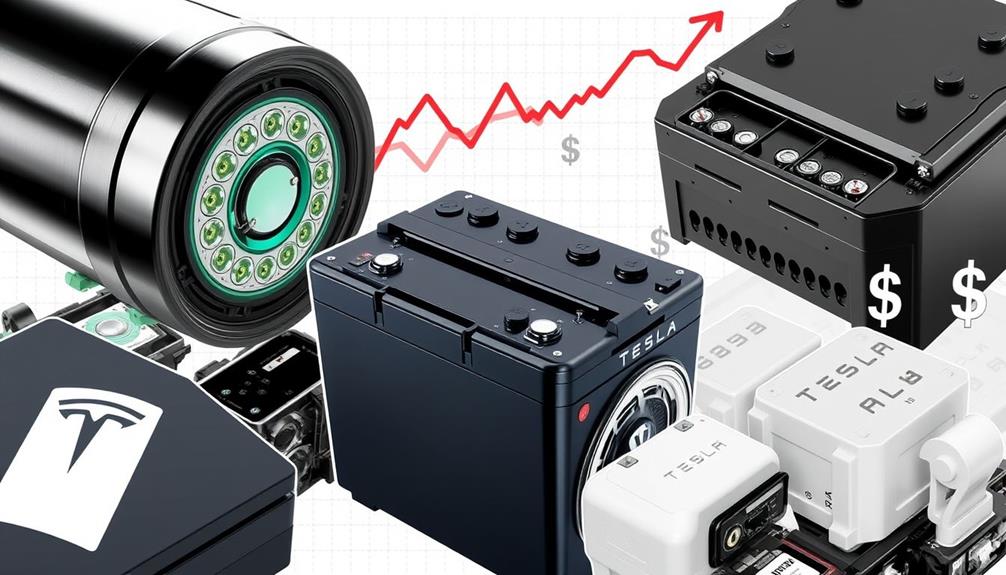
When you’re looking at Tesla battery prices, you’ll notice that specific models can markedly affect costs. For example, the price of a Tesla Model S 75D will differ from that of a Tesla Model 3 Long Range. Additionally, the cost of a Tesla battery will also depend on the size of the battery pack, as larger packs will naturally incur higher costs. You can easily compare and estimate the Tesla supercharging cost breakdown using online calculators and tools provided by Tesla themselves. These resources can give you a better understanding of the overall cost of ownership for a Tesla, including the expenses associated with supercharging.
The battery's capacity also plays a big role, as larger batteries generally come with a higher price tag.
Plus, market demand for essential materials like nickel and lithium can influence what you'll pay when it's time for a replacement.
Model Specific Pricing
Tesla battery replacement costs vary greatly across models, influenced by several key factors. For instance, the estimated cost of a Tesla battery for the Model S battery replacement ranges from $12,000 to $15,500. In contrast, the Model 3 battery replacement typically sits around $13,500.
Meanwhile, the Model X battery replacement costs can exceed $13,900, while the Model Y battery cost is estimated at approximately $10,500 to $11,400.
Labor costs for battery replacement also play a significant role in the overall expenses. These costs generally range from $175 to $200 per hour, leading to total labor costs amounting to $525 to $2,600 for a complete replacement.
Additionally, battery size and capacity greatly affect the pricing of Tesla batteries; larger batteries usually incur higher replacement costs due to their advanced technology and greater range.
Lastly, market trends for EV batteries, including the demand for essential minerals like nickel, cobalt, and lithium, can further influence the pricing of Tesla batteries across different models.
Understanding these factors can help you prepare for potential battery replacement costs.
Battery Capacity Impact
Battery capacity markedly influences the pricing of Tesla batteries, making it a key factor to contemplate. Larger kWh packs translate to higher Tesla battery replacement costs, as they offer increased range and energy storage. Here's a quick comparison of replacement costs across different models:
| Model | Battery Capacity (kWh) | Replacement Cost ($) |
|---|---|---|
| Model S | 100 | 12,000 – 15,000 |
| Model 3 | 75 | ~13,000 |
| Model Y | 75 | ~15,000 |
| Model X | 100 | 15,000 – 22,000 |
| Model 3 Long Range | 82 | ~15,000 |
The Model S, with its higher capacity, can have replacement expenses reaching up to $22,000. In contrast, the average cost for a Model 3 battery stands at around $13,000. Similarly, the Model Y's costs are expected to align with those of the Model 3. Keep in mind that market conditions and the demand for essential minerals like lithium, nickel, and cobalt also notably impact overall battery costs.
Market Demand Influence
The rising demand for electric vehicles has put considerable pressure on the market for essential minerals like nickel, cobalt, and lithium, which are critical for Tesla batteries. This increased market demand drives up replacement costs, often ranging from $5,000 to $20,000, with the average cost for a Model 3 sitting around $13,000.
As more consumers turn to EVs, the demand for these batteries surges, leading to pricing fluctuations and potential shortages. Battery degradation over time and your driving habits can influence when you'll need a replacement, often resulting in higher costs for out-of-warranty replacements.
The scarcity of key minerals like lithium and cobalt plays an important role in this equation, as their prices can vary greatly based on global supply and demand dynamics.
However, the landscape is shifting. The emergence of third-party options for battery replacements is creating competitive pricing dynamics. This could potentially lower your replacement costs in the future, making Tesla batteries more accessible as the market evolves.
Ultimately, understanding these factors can help you navigate the complexities of battery pricing in the ever-growing electric vehicle market.
Warranty Coverage for Tesla Batteries
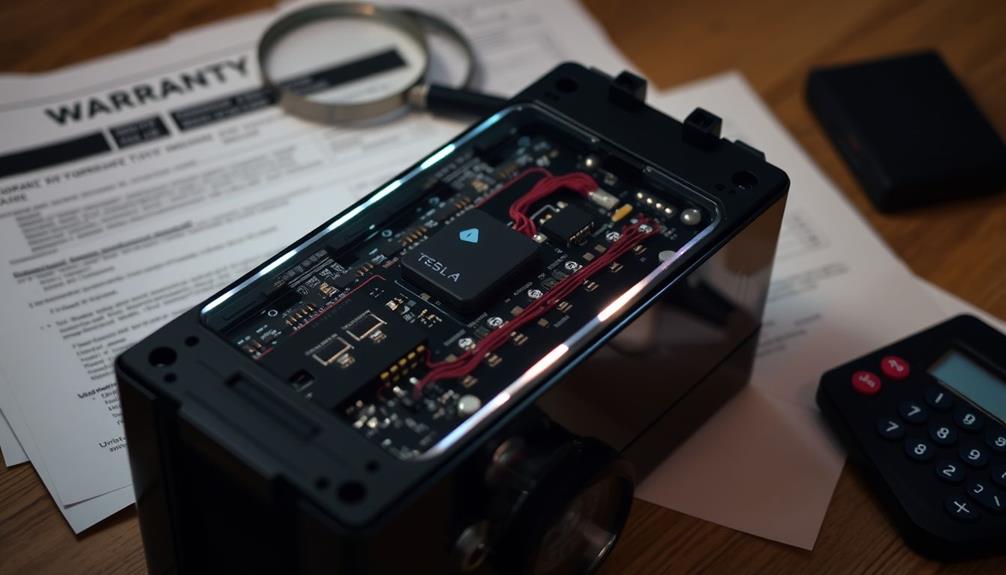
When you invest in a Tesla, you gain peace of mind with its robust battery warranty coverage. Tesla offers an 8-year warranty that varies by model. For the Model S and Model X, you get coverage for up to 150,000 miles, while the Model 3 and Model Y are covered for up to 100,000 miles.
This warranty protects you against significant capacity degradation, ensuring that if your battery's capacity drops below 70% during the coverage period, Tesla will replace it at no cost.
The warranty also covers manufacturing defects and premature aging, so you can drive confidently knowing you're protected. However, keep in mind that external damages or improper maintenance might void this coverage.
One standout feature is that the warranty is transferable to subsequent owners, adding value to your vehicle. This means if you decide to sell your Tesla, the new owner will also benefit from the same battery performance guarantees, enhancing your car's resale potential.
Battery Lifespan and Performance
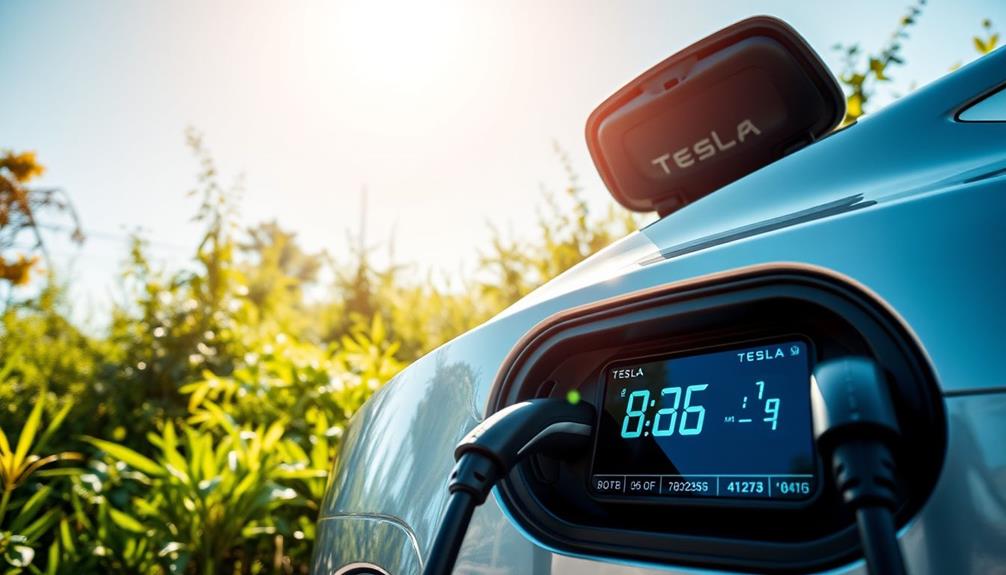
When you own a Tesla, understanding battery lifespan and performance is essential.
Your driving habits, maintenance, and even the climate can greatly affect how long your battery lasts and how well it performs.
Battery Lifespan Factors
Understanding the factors that influence battery lifespan can greatly enhance your Tesla ownership experience. Tesla batteries are designed to last between 10 to 20 years, typically covering 300,000 to 500,000 miles. However, several elements can impact this longevity.
| Factor | Impact on Battery Lifespan |
|---|---|
| Driving Habits | Aggressive driving can shorten lifespan due to higher energy demands. |
| Environmental Conditions | Extreme temperatures can degrade battery performance. |
| Maintenance Practices | Regular check-ups at Tesla service centers can extend battery life. |
Your driving habits play an essential role; smooth, efficient driving enhances battery performance. Environmental conditions, like temperature fluctuations, also affect battery retention. Maintaining at least 70% battery retention guarantees warranty eligibility for battery replacement after 8 years or 100,000-150,000 miles, depending on your model.
Lastly, higher kilowatt-hour (kWh) capacity batteries provide increased range, contributing to a better driving experience. By being mindful of these factors, you can maximize your Tesla battery's lifespan and overall performance.
Performance Impact Elements
Tesla's battery performance is closely tied to various elements that can greatly enhance or diminish your driving experience. One major factor is battery health, which directly affects your vehicle's efficiency and driving range.
With proper maintenance practices and regular check-ups at a Tesla service center, you can monitor your battery's condition and guarantee it performs at its best throughout its lifespan.
Your driving habits also play an important role. Aggressive acceleration or frequent supercharging can lead to battery degradation, impacting overall performance.
Similarly, the frequency of supercharging affects battery health; while it's convenient, over-reliance on fast charging can shorten your battery's lifespan.
Tesla batteries typically last between 10 to 20 years, maintaining over 70% capacity after 8 years, but that can vary based on how you drive and care for your vehicle.
Higher kWh capacity batteries, like those in the Model S and Model Y, offer extended driving ranges, which can enhance your performance experience.
Replacement Options and Services
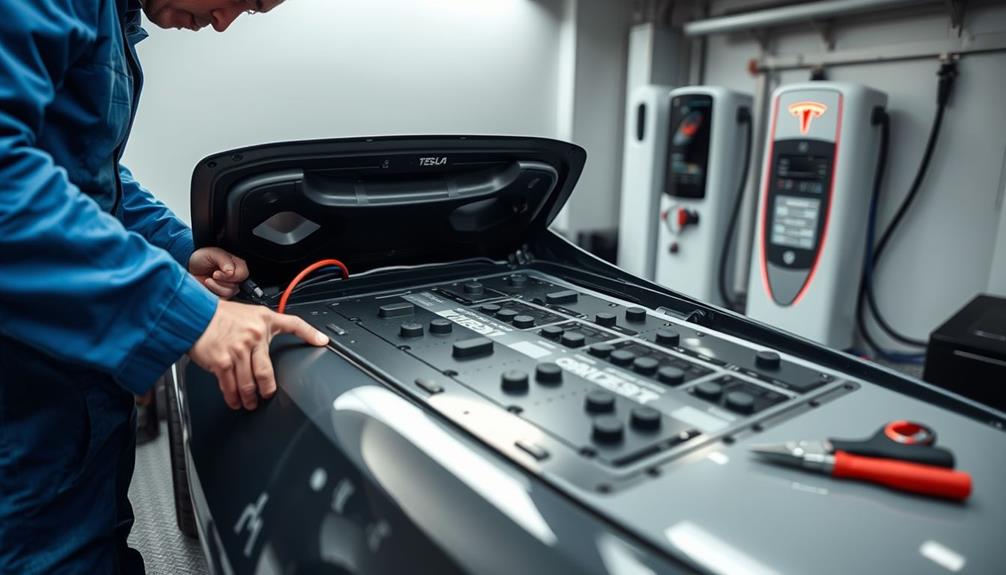
Battery replacement for your Tesla can be handled through various options, each with its own pros and cons. You can choose to go to Tesla service centers, which offer specialized expertise but may come with higher battery replacement costs.
For instance, replacing the battery in a Model 3 averages around $13,000, with costs ranging from $5,000 to $20,000 depending on the model.
If you're looking for lower prices, third-party shops might be a viable alternative. However, keep in mind that they often lack the specialized knowledge required for complex repairs on Tesla vehicles.
While scheduling your service through the Tesla app can simplify the process, it's important to weigh your options carefully.
For the more adventurous, DIY battery replacement is possible, but it's not recommended unless you have solid technical expertise. The complexity of the task can lead to potential issues down the line if not executed properly.
Ultimately, your choice of replacement option will depend on your budget, comfort level with repairs, and the importance you place on specialized care for your Tesla.
Tips to Extend Battery Life
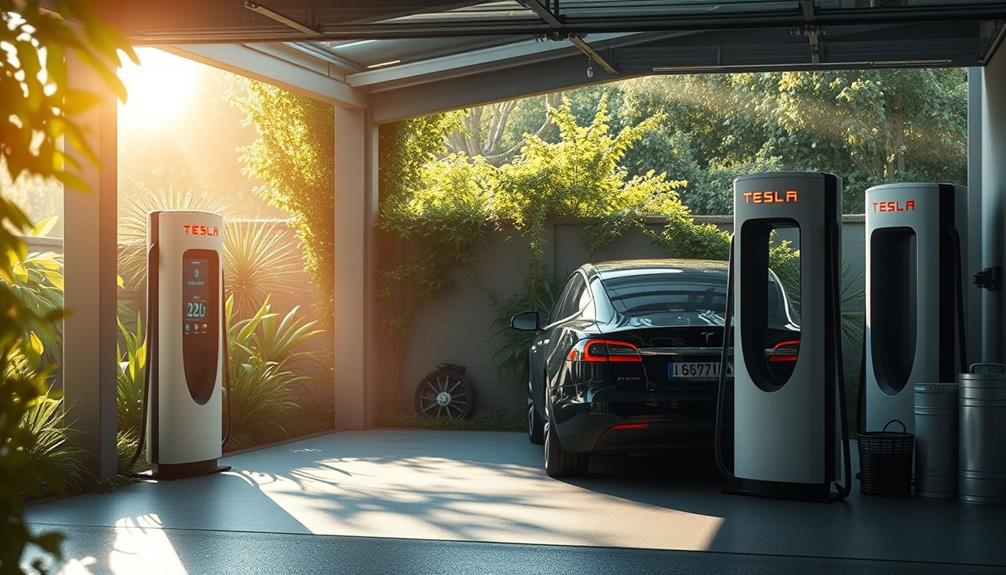
Maintaining your Tesla's battery health is just as important as knowing your replacement options. To enhance battery longevity and extend your battery lifespan, follow a few simple tips.
First, store your Tesla in a garage to protect it from extreme temperature fluctuations, which can severely impact performance.
Next, pay attention to your charging habits. Keep your battery's charge level between 20% and 80% to minimize stress and reduce battery degradation. Frequent full discharges can lead to faster capacity fade, so it's best to avoid them.
Whenever possible, opt for home charging instead of relying on DC Fast Charging, as rapid charging can accelerate battery wear.
Monitor your battery's health regularly through the Tesla app, and don't hesitate to schedule check-ups at service centers to catch any issues early.
Additionally, reducing cargo weight and choosing flat driving routes can improve energy efficiency, which ultimately decreases the strain on your battery during operation.
Frequently Asked Questions
What Percentage of a Tesla Cost Is the Battery?
The battery accounts for about 30% to 40% of your Tesla's total cost. Depending on the model, this percentage can fluctuate, considerably impacting the overall price you pay for your electric vehicle.
How Much Does a Tesla 100 Kwh Battery Cost?
If you're seeking specifics, a Tesla 100 kWh battery typically costs between $13,900 and $15,500. Total expenses, including labor and parts, can escalate to around $20,000 to $28,000, depending on various factors.
What Is the Life Expectancy of a Tesla Battery?
Tesla batteries typically last between 10 to 20 years, depending on your driving style and environmental factors. With proper care, you can enjoy a battery that retains over 70% capacity even after eight years.
Is the Battery the Most Expensive Part of Tesla?
Think of your Tesla as a high-tech orchestra; the battery's the conductor. Yes, the battery's the most expensive part, driving performance and range, but its longevity and efficiency make it worth every penny in the long run.
Conclusion
So, there you have it—Tesla batteries might cost a pretty penny, but who needs a bank account anyway? Just think of it as investing in a fancy paperweight that runs on dreams and sunshine! With warranties and service options, you're basically covered, right? Just remember, the secret to longevity isn't just in the battery; it's in your ability to keep your wallet open. After all, who wouldn't want to keep the dream of electric luxury alive—at any cost?
